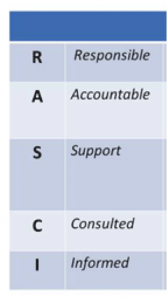We’ve all seen the chart. It looks like this.
RASCI. It’s a model for how to run projects in complex organizations. Different people take different roles along the RASCI spectrum.
Responsible means you’re on the hook for doing most of the work. Support means you need to be available to help the responsible party. Consulted means you’re asked for help by the responsible party. Informed means you’re passively included on the communication chain.
But what does it mean to be Accountable?
The formal definition of Accountable is easy. It means you have final sign off over work completed and you’re the “single throat to choke” if the project goes awry. However, I think this simple definition downplays one of the most important roles that comes with being Accountable.
What being accountable really means is you have to constantly be asking your self a series of questions:
What would need to happen to make this project successful?
What milestones do we need to hit between now and project completion?
What kind of timeframe do we have to complete this project?
Do I have the right people in place to help complete this project?
Etc, etc.
And the list goes on.
But is there a simpler way to convey the job of being Accountable? This week I was thinking more about this question.
I think it really boils down to an analogy of transportation. At the bare minimum, the single accountable person needs to be able to answer the following three questions:
Where are we now?
Where are we going?
What kind of vehicle are we in?
The first two are obvious. If you don’t know where you are now or where you are going, you’ll never steer the project through to success. However, the third question here I find most important – especially on large projects where the distance between where you are now and where you’re going is very large.
Is your project team currently paddling across the Atlantic in a life raft? Or are they flying close to the speed of sound in a jumbo jet?
If you’re Accountable, you need to make sure your team has the right kind of resources, equipment, attention of management, clarity of goals, etc. AND you need to make sure that you’re team is moving at an appropriately fast pace.
If you have a team that isn’t on the track to success – they are essentially afloat in the middle of the ocean. In this case: “Just keep paddling” is not going to get them anywhere. With an entire ocean ahead of them they could work for the next two years and not get to where they’re going.
If you do find that your team is huddled in a life raft – it’s your job to fire off flares until the team is rescued or order the team to paddle back to shore and regroup.
If you can’t get them a better vehicle – it’s your job to find the team someone who can.
